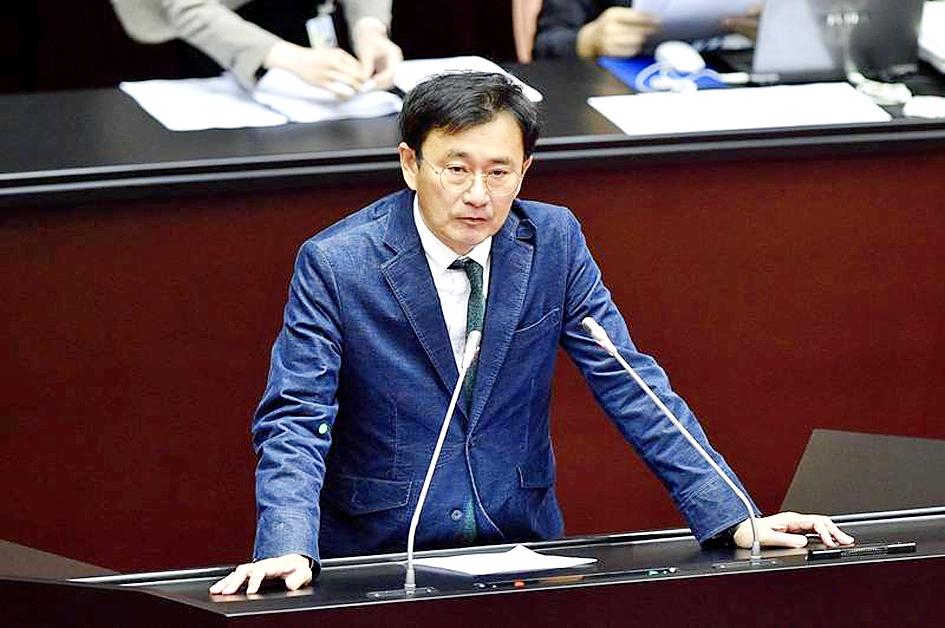Democratic Progressive Party (DPP) Legislator Huang Kuo-shu (黃國書) yesterday said he would leave the party and would not seek re-election, as he confirmed a report that he worked as an informant for the Chinese Nationalist Party (KMT) authoritarian regime when he was a student.
The Chinese-language Liberty Times (the Taipei Times’ sister newspaper) reported on Saturday that Huang, 57, worked as an informant for the KMT when he was in college.
Huang yesterday on Facebook said he accepts political responsibility for working with the authoritarian government to spy on his fellow students when he was in university and apologized to those affected by his actions.

Photo: Hsieh Chun-lin, Taipei Times
He also said he would resign from the DPP.
“Back then, I made friends with dissidents, and the authorities came to me saying that I would ‘run into trouble’ if I kept associating with the dissidents,” he wrote. “They told me that I would be protected if I helped them gather information.”
After several meetings with the authorities he believed them and cooperated with their demands, he wrote.
Huang did not specify for how long he provided information or when, only saying that he was in his early 20s at the time, which means he became an informant in the mid-1980s, not long before martial law was lifted in 1987.
“Since taking office [as a lawmaker] I have worked hard to promote Taiwan’s local history and culture. I believe that was my way of seeking redemption,” he wrote. “I cannot take back what I have done, but I still hope to contribute to Taiwanese society.”
Huang said he would finish his term as legislator and withdraw from the DPP afterward to perform cultural and public welfare roles.
DPP spokeswoman Yen Juo-fang (顏若芳) said the party respected Huang’s decision, as well as his “bravery in facing his past.”
DPP caucus whip Ker Chien-ming (柯建銘) praised Huang and said he hoped Huang would remain in the DPP to “help it defend Taiwan.”
DPP Legislator Fan Yun (范雲), who has said she was monitored by the KMT for years during the Martial Law era, said she was “shocked and deeply hurt” upon learning about Huang’s past actions, but that she also felt his admission was “an important first step” toward bringing facts to light.
DPP Legislator Mark Ho (何志偉) said he respected Huang, adding that he felt that during the Martial Law era it was not uncommon for people to do things that were uncharacteristic of them.
Asked about the issue, KMT Chairman Eric Chu (朱立倫) said he had no comment, but described it as the DPP’s factional infighting.
However, he said that the authoritarian government during the Martial Law era was a product of the times and was not the real KMT.
Chu said democracy in Taiwan has regressed under the DPP administration.
The DPP is an “authoritarian regime” that does not allow diversity or dissent, he said.
Additional reporting by Yang Chun-hui and CNA

OPTIMISTIC: The DGBAS sharply upgraded its GDP growth estimate from 3.54 percent to 7.71 percent after the Taiwan-US trade agreement signing and given AI optimism The US imported more from Taiwan than China for the first time in decades, as US President Donald Trump’s tariffs reshape trade flows while a global boom in artificial intelligence (AI) fuels demand for tech products. US purchases of goods from China plunged almost 44 percent in December last year from 2024 to US$21.1 billion, US Department of Commerce data showed on Thursday. By contrast, shipments from Taiwan more than doubled during the same period to US$24.7 billion. The soaring Taiwanese shipments to the US reflect the huge expansion in supplies of chips and servers for AI companies, which has completely changed

The Central Election Commission has amended election and recall regulations to require elected office candidates to provide proof that they have no Chinese citizenship, a Cabinet report said. The commission on Oct. 29 last year revised the Measures for the Permission of Family-based Residence, Long-term Residence and Settlement of People from the Mainland Area in the Taiwan Area (大陸地區人民在台灣地區依親居留長期居留或定居許可辦法), the Executive Yuan said in a report it submitted to the legislature for review. The revision requires Chinese citizens applying for permanent residency to submit notarial documents showing that they have lost their Chinese household record and have renounced — or have never

US and Chinese fighter jets briefly faced off above waters near the Korean Peninsula this week, Yonhap News agency reported, marking a rare confrontation in that area between the two superpowers. About 10 US fighter jets on Wednesday departed an airbase in Pyeongtaek, South Korea, for drills above international waters off South Korea’s western coast, the news outlet cited unidentified military sources as saying. While the US planes did not enter China’s air defense identification zone, Beijing scrambled planes as they neared that region, the report said. “The Chinese People’s Liberation Army organized naval and air forces to monitor and effectively respond

Taiwan has secured another breakthrough in fruit exports, with jujubes, dragon fruit and lychees approved for shipment to the EU, the Ministry of Agriculture said yesterday. The Animal and Plant Health Inspection Agency on Thursday received formal notification of the approval from the EU, the ministry said, adding that the decision was expected to expand Taiwanese fruit producers’ access to high-end European markets. Taiwan exported 126 tonnes of lychees last year, valued at US$1.48 million, with Japan accounting for 102 tonnes. Other export destinations included New Zealand, Hong Kong, the US and Australia, ministry data showed. Jujube exports totaled 103 tonnes, valued at